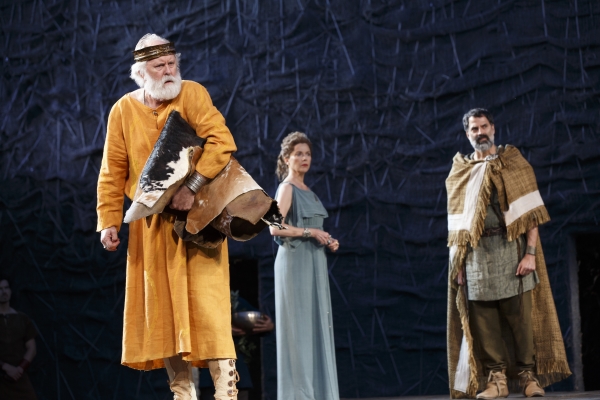King Lear
Daniel Sullivan’s production of Shakespeare’s classic combines holy ritual with Iron Age fashion.

(© Joan Marcus)
A pagan priest wearing an ivy garland blesses the stage with holy water in the opening moments of director Daniel Sullivan's new production of William Shakespeare's King Lear, now playing at The Delacorte Theater as the second production of this summer's Shakespeare in the Park. It's an intriguing moment of ritual in a production in which deference to ritual has a diminishing return.
Crumbling institutions, ungrateful children, irresistible senility — King Lear is a seemingly endless font of themes that resonate with modern times. Perhaps that is why this is the third major production of Lear this year (Frank Langella starred in a British production at BAM and Michael Pennington took the title role at Theatre for a New Audience). This production, starring John Lithgow, shines a spotlight on the peculiarities of Shakespeare's cultural biases (an obsession with divine intervention, a distrust of illegitimate children) while glossing over the more universal aspects of the play.
Lear is the powerful and long-reigning King of Ancient Britain. He has tired of governing and elects to divide his kingdom among his three daughters: Goneril (Annette Bening), Regan (Jessica Hecht), and Cordelia (Jessica Collins). He plans to keep a retinue of knights and live out the rest of his days in leisure. Yet when his youngest (and favorite) daughter, Cordelia, fails to flatter her father with florid praises like her older sisters, Lear disinherits her, leaving everything to Goneril and Regan (pronounced in this production like the president). He lives to regret this decision as he discovers the treachery of his eldest in the face of his waning real-world power. Meanwhile, Edmund (Eric Sheffer Stevens), the upstart bastard son of the Earl of Gloucester (Clarke Peters), plots to use this royal mess to sideline his "legitimate" brother Edgar (Chukwudi Iwuji) and overtake his aged father for the earldom.
The stakes of this play derive from the peace and prosperity of the kingdom, which the vain and foolish elites readily squander in pursuit of their petty squabbles and lusts. Master set designer John Lee Beatty has been tasked with visualizing the realm. He eschews his characteristic real-estate-porn realism for something earthier, creating a wooden platform surrounded by mulch and lit by fire. While this does strike the appropriate Iron Age tone, along with a giant black backdrop pierced by hundreds of needles that makes a nice, itchy touch, we never really get the sense by the end that anything has been lost, spare the wits, fortunes, and lives of the Lear clan and their circle.
These ancient British warlords have little in common with modern audiences. So who in this play is relatable? This lavish production has been blessed with 11 ensemble members to play various knights, attendants, and spear carriers. All sport scruffy beards and are handsomely outfitted in leather and burlap. While these people could have been our key to the world outside the rarified halls of power, under Sullivan’s staging, they feel lifeless.
Moreover, certain stylistic elements feel more hollow than hallowed. Two metallic sheets bookend the stage and are each manned by a drummer. They make a thunder-like rumble when struck and are used to accent the text in the same manner bells might accent a Catholic mass. Lear's famous "Blow, winds" speech wouldn't sound out of place in a kabuki play, the percussive underscoring is so prominent. Yet this convention does not carry through to other scenes, making this element of ritualistic live music seem like an afterthought.
This is surprising because Sullivan (a staple of the Delacorte Theatre for the last decade) is an uncommonly shrewd interpreter of Shakespeare. His productions usually feel fresh and alive, ready to offer new insight into centuries-old texts. Yet despite the very specific and period-appropriate design of this Lear, the text seems to muddle along flatly. The fact that several of the actors stumble over the meter throughout betrays the lack of connection between the words and real-world stakes.
Lithgow offers the one glimmer of a coherent and urgent narrative in the play. His Lear undergoes a remarkable transformation. In the beginning, he's a mean old bastard, chucking things at his loved-ones and growing red in the face over the tiniest of slights. As he realizes his impotence, this Sturm und Drang fades to madness. Only with the reemergence of Cordelia does he regain some semblance of sanity, realizing how much he still has in life, even though he's lost a whole kingdom. "No, no, no, no. Come, let's away to prison," Lear advises Cordelia after she's lost the battle to regain her father's throne. "We two alone will sing like birds i' the cage." These words, so cheerily and desperately spoken, have never been clearer or more resonant. The final blow of Cordelia's death is an immeasurable tragedy, embodied in Lithgow's animalistic howl.
There are other good performances as well: Bening and Hecht play an excellent good cop-bad cop routine. Hecht, in particular, is like a candy-coated cyanide pill: sweet on the outside, deadly on the inside. Both are insufferable princesses, happy to live off the fat of their inheritance, with no real intention of building upon it.
None of it is enough to compensate for the remaining three hours of holy tedium. I now understand much better why Catholic priests ask their congregants to sit, stand, and kneel during Mass: It keeps the audience engaged through what is otherwise a boring ritual.









